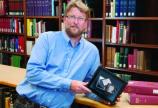Ray Siemens on the digital humanities and the future of the book
- Danica Boyce

What do new reading technologies, such as the e-book, mean for the future of the humanities? Dr. Ray Siemens, Canada Research Chair in Humanities Computing, posed this question at the University Club on June 28, as the guest speaker at the UVic Alumni Association’s Annual General Meeting.
His presentation was titled “The Future of the History of the Book (or, What Are the Digital Humanities and What Have they Done for Me Lately?)” This emerging field, at the intersection between computational methods and the humanities, could determine to a large degree the future of reading and interpretive practices.
Siemens began by outlining the past and present role of the humanities in academia, saying a chief function of the humanities is “to understand human experience over time in the context of the present, and at the same time to flip that around and suggest that we can understand the present in the valuable context provided us by human experience over time—not just yesterday, not 10 years ago, but hundreds—thousands of years.”
Thus, he says, “humanities scholarship is not just about knowing books from the past, or plays from the past, or understanding inscriptions on ancient vases. It’s about the value inherent in being able to bring to bear pertinent elements of the past on our experience of the present and to be able to comprehend elements of the present through the lens of the past.”
Siemens noted that the field of digital humanities doesn’t only address the modernization of books through the use of digital technology, but also contributes valuably to the development of emerging digital technologies through reflection on the history of books.
He showed his audience how information technology’s lineage has depended heavily on work done by humanities scholars, recalling that in the early days of computing and during the development of the internet, computer scientists drew inspiration from data retrieval systems previously used, in one case, to catalogue and describe early manuscripts and printed books and, in another, to nagivate vast bodies of text in print form via tools such as concordances—in use for centuries by scholars wishing to document and navigate the voluminous works of authors like Thomas Aquinas and John Milton, as his examples showed.
On the topic of e-books and dedicated electronic readers, Siemens remains ambivalent. He asked the audience if any of them were book lovers. The response was overwhelmingly positive. He noted that he had “never heard anyone say they were an e-book lover,” but admitted that these devices are doubtless shaping the future of the book.
He expressed a mixture of excitement and worry about the possibilities presented by literary digitization, saying that product developers try to simulate what book lovers desire in an object, but that so far, these devices are “a pale reflection” of the traditional book. “An electronic document has a different functionality from the printed page. For instance, it is only recently that we have begun to be able to write in the margins of an e-book.”
His general opinion? “I believe the book is here to stay, and what’s best about the book will be brought into the world of the e-book – over time.”
Siemens is distinguished professor in the Department of English, specializing in Early Modern texts. He also contributes to the Department of Computer Science, and heads the SSHRC-funded “Implementing New Knowledge Environments” project (INKE), a digital humanities research group that seeks to investigate the many questions produced by this dynamic and burgeoning intersection between information technology and the humanities.

